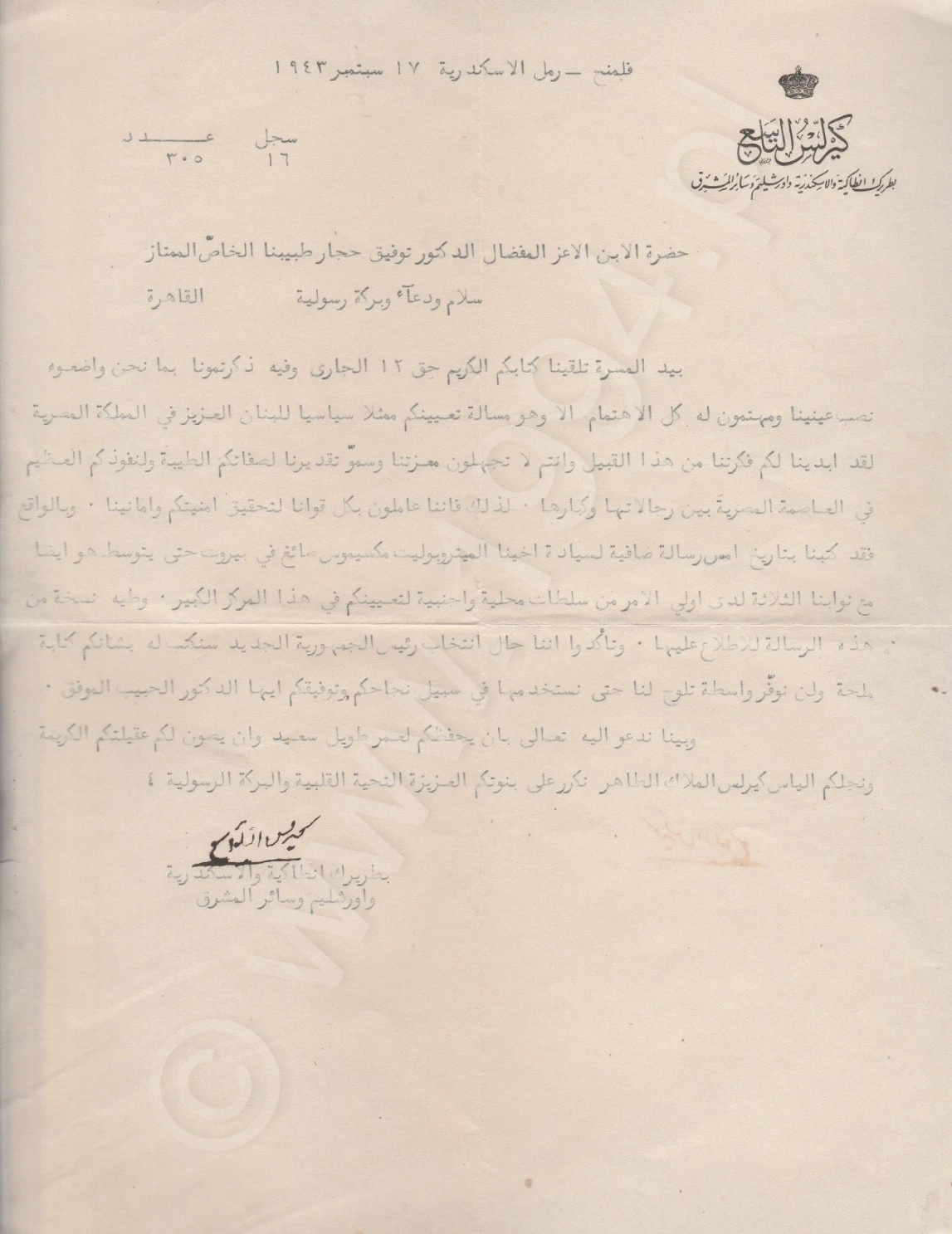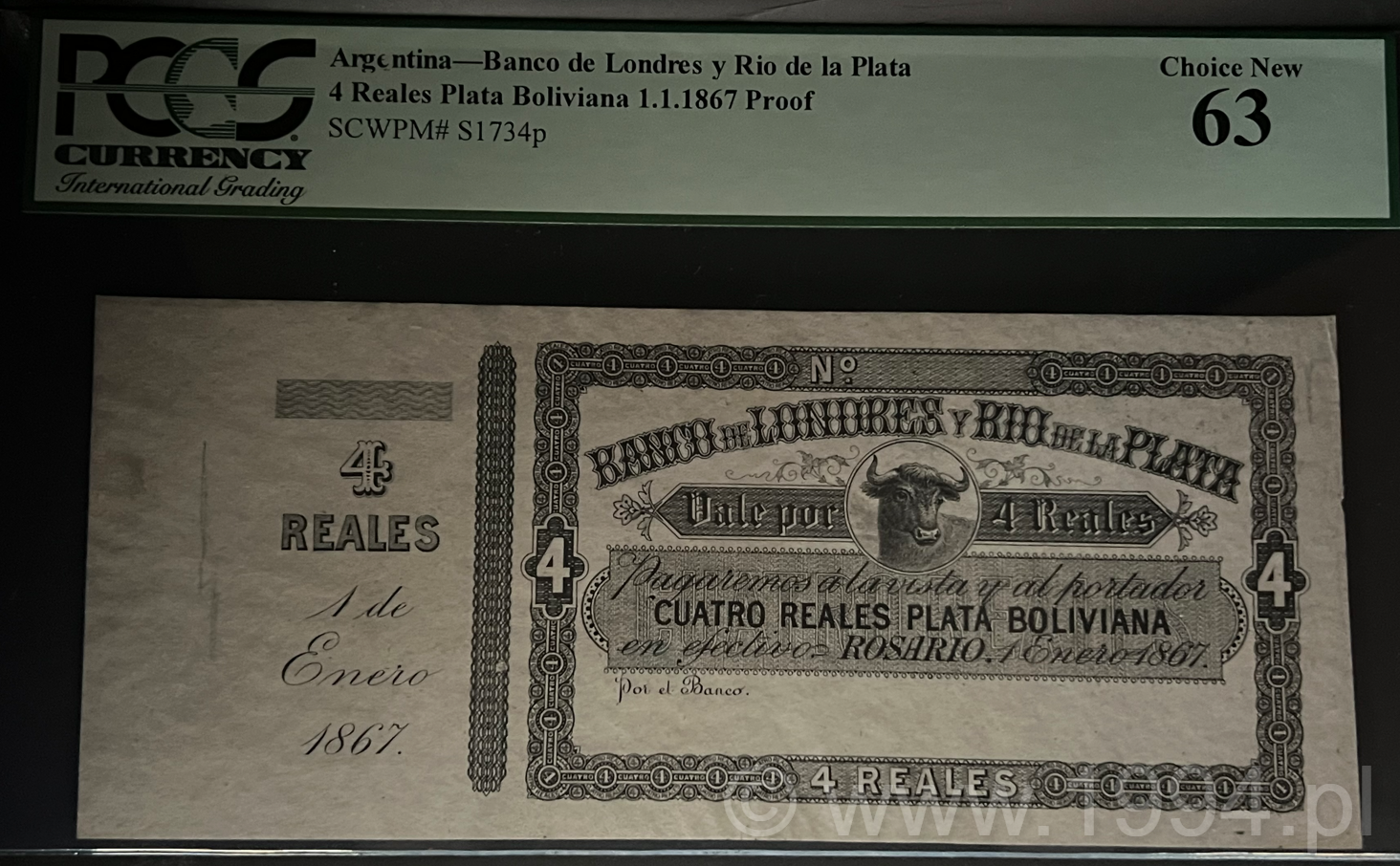“Behind the Curtain in Alexandria” — Cyril IX Moghabghab & a 1943 Patriarchal Letter · Melkite Politics in Wartime Egypt

Politics in Ink — Patriarch Cyril IX in Wartime Alexandria, 1943
On 17 September 1943, in the Fleming–Ramleh district of Alexandria, Melkite Greek Catholic Patriarch Cyril IX Moghabghab issued a letter that blends religion, politics, influence, and wartime diplomacy. What appears at first glance to be a pastoral response to a trusted physician is, in content, a coordinated political intervention executed from inside the Patriarchal chancery at the end of the Second World War.
The addressee, Dr. Tawfiq Hajjar, was the Patriarch’s private physician in Cairo. His earlier letter requested support for his appointment as a political representative of Lebanon in the Egyptian kingdom. This reply — preserved entirely in the Patriarch’s own words — confirms that the matter was not merely acknowledged but already set in motion at the highest ecclesiastical and political levels.
I. Heading and salutation
فلمينغ – رمل الإسكندرية في ١٧ سبتمبر ١٩٤٣
سجل ١٦ عدد ٣٠٥Fleming – Ramleh, Alexandria, 17 September 1943
Register no. 16 File no. 305
Then follows the formal patriarchal greeting:
حضرة الابن الأعز المفضال الدكتور توفيق حجار طبيبنا الخاص الممتاز،
سلام ودعاء وبركة رسولية،
القاهرة“To our dearest and most honourable son, Dr. Tawfiq Hajjar, our excellent personal physician,
peace, prayer and apostolic blessing.
Cairo.”
II. The request: A political post for Lebanon
The Patriarch states directly that Hajjar seeks appointment as Lebanon’s political representative in Egypt, and that this request is being handled with full priority:
... ألا وهو مسألة تعيينكم ممثلاً سياسياً للبنان العزيز في المملكة المصرية...
“... namely the question of your appointment as political representative of beloved Lebanon in the Egyptian kingdom...”
Cyril IX goes on to praise Hajjar’s stature, reputation, and influence in Cairo — qualities he argues justify and support such an appointment.
III. Action already taken: letters to Beirut
The most consequential section of the letter describes concrete steps already taken. Cyril IX reports that he has written a detailed letter to Metropolitan Maximos Sayegh in Beirut (later Patriarch Maximos IV), instructing him to confer with political deputies and both local and foreign authorities:
وقد كتبنا بتاريخ أمس رسالة مفصلة إلى أخينا المكرم سيادة المطران مكسيموس صايغ في بيروت حتى يراجع هو أيضاً مع النواب الثلاثة لدى أولي الأمر من السلطات المحلية والدوائر الأجنبية في هذا المركز الكبير، وطيّة نسخة من هذه الرسالة للاطلاع عليها.
“Yesterday we wrote a detailed letter to our honoured brother, His Grace Metropolitan Maximos Sayegh in Beirut, so that he in turn may confer, together with the three deputies, with those in authority in the local government and in the foreign chancelleries concerning this important post. Enclosed is a copy of that letter for you to read.”
This is political lobbying spelled out explicitly: a Patriarch coordinating political persuasion across religious, local, and foreign institutions.
IV. The future step: Pressure on the new President
Cyril IX then signals his intention to escalate the matter to the highest possible level:
ونؤكد أننا حال انتخاب رئيس الجمهورية الجديد سنكاتبُه بشأنكم كتابة ملحّة، ولن نوفر وسيلة لنا حتى نستخدمها في سبيل نجاحكم وتوفيقكم، أيها الدكتور الحبيب الأمين.
“We also affirm that, once the new President of the Republic has been elected, we shall write to him about your case in an insistent manner, and we shall not spare any means available to us that we may use for your success and advancement, dear and faithful doctor.”
This line is unusually candid — a Patriarch pledging to intervene directly with the incoming head of state.
V. Closing blessing and signature
The letter ends with a pastoral blessing, followed by a strong dip-pen autograph that cuts across the printed title:
كيرلس التاسع
بطريرك أنطاكية والإسكندرية وأورشليم وسائر المشرق“Cyril IX — Patriarch of Antioch, Alexandria, Jerusalem and All the East.”
VI. Full Arabic text (transcribed from the original document)
فلمينغ – رمل الإسكندرية في ١٧ سبتمبر ١٩٤٣
سجل ١٦
عدد ٣٠٥
حضرة الابن الأعز المفضال الدكتور توفيق حجار طبيبنا الخاص الممتاز،
سلام ودعاء وبركة رسولية،
القاهرة
بعد المسرة تلقينا كتابكم الكريم بتاريخ ١٢ الجاري وفيه ذكرتمونا بما نحن واضعوه
نصب أعيننا ومهتمون له كل الاهتمام، ألا وهو مسألة تعيينكم ممثلاً سياسياً للبنان العزيز
في المملكة المصرية.
لقد أبدينا لكم في هذا القبيل أننا لا نغفل عن منزلتكم الممتازة، وسعة تقديرنا لسمعتكم
الحسنة ونفوذكم الموقر في العاصمة المصرية بين رجالها وكبارها، ولذلك نبذل كل قوانا
لتحقيق أمنيتكم وآمالنا.
وقد كتبنا بتاريخ أمس رسالة مفصلة إلى أخينا المكرم سيادة المطران مكسيموس صايغ في بيروت
حتى يراجع هو أيضاً مع النواب الثلاثة لدى أولي الأمر من السلطات المحلية والدوائر
الأجنبية لتعيينكم في هذا المركز الكبير، وطيّة نسخة من هذه الرسالة للاطلاع عليها.
ونؤكد أننا حال انتخاب رئيس الجمهورية الجديد سنكاتبُه بشأنكم كتابة ملحّة، ولن نوفر وسيلة
تلوح لنا حتى نستخدمها في سبيل نجاحكم وتوفيقكم، أيها الدكتور الحبيب الأمين.
وبينما ندعو إلى الله تعالى بأن يحفظكم لعمر طويل سعيد، وأن يقرّ عينكم بزوجتكم الكريمة
وأهلكم الفاضل، نرسل إليكم، أيها الابن العزيز، تكرار مودتنا الأبوية الثمينة وبركتنا الرسولية.
كيرلس التاسع
بطريرك أنطاكية والإسكندرية وأورشليم وسائر المشرق
VII. Full English translation
Fleming – Ramleh, Alexandria, 17 September 1943
Register: 16 Number: 305To our dearest and most honourable son, Dr. Tawfiq Hajjar, our excellent personal physician,
peace, prayer and apostolic blessing.
Cairo.
With joy we received your honoured letter of the 12th of this month, in which you reminded us of the matter that we have placed before our eyes and to which we give all our attention — namely the question of your appointment as political representative of beloved Lebanon in the Egyptian kingdom.
We do not overlook your distinguished standing, nor the extent of our appreciation for your good reputation and esteemed influence in the Egyptian capital among its leading men. For this reason we are exerting all our strength to realise your wish and ours.
Yesterday we wrote a detailed letter to our honoured brother, His Grace Metropolitan Maximos Sayegh in Beirut, so that he in turn may confer, together with the three deputies, with those in authority in the local government and in the foreign chancelleries concerning this important post. Enclosed is a copy of that letter for you to read.
We also affirm that, once the new President of the Republic has been elected, we shall write to him about your case in an insistent manner, and we shall not spare any means available to us that we may use for your success and advancement, dear and faithful doctor.
As we pray to the Most High that He may preserve you for a long and happy life and gladden your eyes with your noble wife and honourable family, we send to you again our precious paternal affection and our apostolic blessing.
Cyril IX
Patriarch of Antioch, Alexandria, Jerusalem and All the East.
VIII. A document of influence in wartime Alexandria
This letter is not a footnote — it is a rare, unfiltered window into ecclesiastical diplomacy in the Middle East during the last years of the Second World War. It shows a Patriarch engaging directly with political actors in Beirut and planning to lobby the incoming Lebanese President for a preferred appointment in Egypt.
In a landscape where religious authority, national identity and foreign influence overlapped, this sheet of paper captures a moment when church and state operated through the same channels — and when a Patriarch’s pen could still move political machinery beyond the walls of his chancery.

